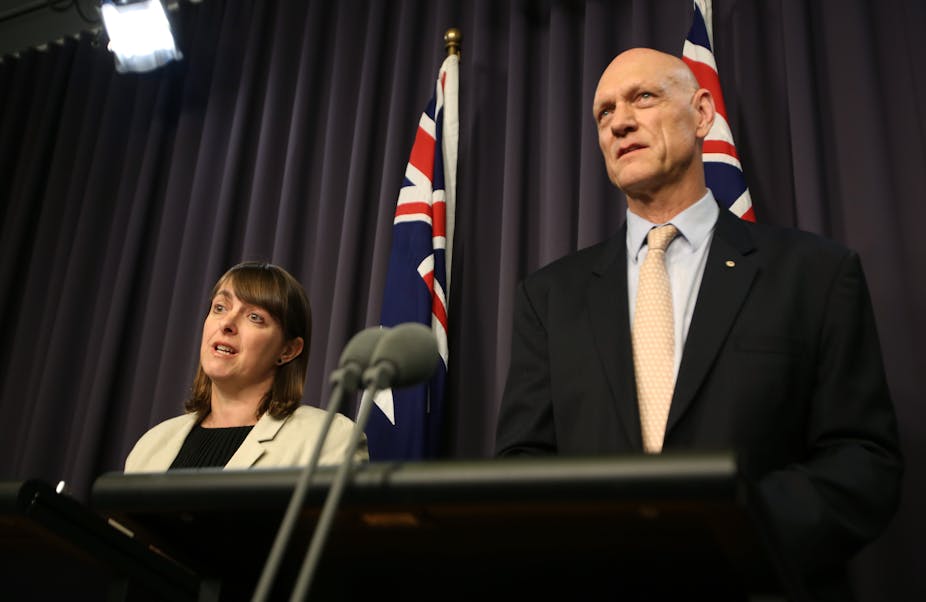Today, the High Court of Australia dramatically altered the previously understood scope of the Commonwealth’s power to spend money and enter into contracts. This decision has immediate repercussions for many Commonwealth funding agreements, many of which will require quick restructuring to be saved.
Williams v Commonwealth involved a challenge to the National School Chaplaincy Program (NSCP) brought by Ronald Williams, a parent of children who attended the Darling Heights State Primary School in Queensland. Williams challenged a funding agreement entered into between the Commonwealth and Scripture Union of Queensland, the group who provided chaplaincy services at the School.
So how can a case about school chaplains now affect how the government in Canberra funds programs?
A complicated case
There were several bases for the constitutional challenge. One of the most publicised was the argument that it breached section 116 of the Constitution by requiring a religious test for an office under the Commonwealth. At Darling Heights State Primary School the chaplain was employed by Scripture Union of Queensland, which was funded by the Commonwealth.
The High Court unanimously dismissed this argument, and held that the connection between the chaplain and the Commonwealth was not sufficient to render the chaplain an “office under the Commonwealth”.
The point the case turned on then involved the breadth of the Commonwealth government’s power to spend money and enter into contracts. This power is governed by the breadth of the Commonwealth’s executive power but this power is ill-defined.
Section 51 lists the legislative “heads of power” – specific areas of power. But executive power is not spelled out in the same way under section 61.
Money and power
Prior to this case there had been a long-held assumption that the Commonwealth executive power extended to entering into contracts and funding agreements in, at least, areas that fell within the Commonwealth’s legislative heads of power – even where the Parliament had not passed legislation authorising those contracts and agreements.
If that was correct, the question would have been whether the funding agreement between the Commonwealth and the Scripture Union fell within the legislative heads of power, argued in this case under section 51(xx) and section 51(xxiiiA) of the Constitution with respect to trading corporations and the provision of benefits to students.
In this case, four of the judges (Chief Justice French and Justices Gummow, Bell and Crennan) expressly rejected this position. Two judges (Justices Hayne and Kiefel) did not determine this issue because they found the funding agreement did not fall within ss 51(xx) or (xxiiiA). Justice Heydon dissented.
The majority decision
The main reasons advanced by the majority centred on the federal nature of our constitutional system, and the importance of responsible and representative government (and therefore the role of Parliament) in it.
So, for example, Chief Justice French notes that if the Commonwealth had a wide executive power to spend money, there are “consequences for the Federation” which would flow from that. After all, funding is an essential tool of public administration and for government policy.
If the Commonwealth had power to enter into such agreements without legislative backing, policies could be implemented in the absence of scrutiny from the Parliament, including the Senate.
So, generally speaking, it appears that the Commonwealth will need statutory authority to enter into contracts and spend public money. This exposes funding agreements to the scrutiny of the Houses of Parliament.
However, the majority indicated there will be some exceptions to this position, for example, contracts required to administer the departments of the Commonwealth pursuant to section 64 of the Constitution.
The funding agreement for the chaplaincy program was held by the majority not to fall within these exceptions and was, therefore, invalid.
Flow on effects
There are many other funding agreements made by the Commonwealth, for example, many of the grants paid directly to local governments, which will fall outside these exceptions.
The Commonwealth must act quickly if it wants to save these types of agreements, including the agreements under the school chaplaincy program. Commonwealth funding agreements must be divided into two types: those that are with respect to the Commonwealth’s legislative specific areas of power but have no legislative backing at the moment; and those that are not with respect to the Commonwealth’s legislative specific areas of power.
The first type can probably be saved relatively easily by legislation that retrospectively validates and provides authority to enter into these contracts.
This could be done on a piecemeal basis, or as Sir Owen Dixon once suggested, through a “General Contracts Act”. This could say that the the Commonwealth Executive is and has been authorised to enter into any particular contract or agreement the entry into which could be or could have been authorised by any law made pursuant to any of the heads of legislative power in ss 51, 52 and 122 of the Constitution.
For the agreements under the NSCP this would then raise the question of whether they are “with respect to” any of the heads of legislative power. Justices Hayne and Kiefel have already expressly found that they are not. Justice Heydon found that they are. The other judges did not decide the question.
Those agreements that are not referable to a head of legislative power cannot be saved in this way. That’s not to say these funding arrangements cannot be saved at all. The Commonwealth Parliament has an (almost) unlimited power to make grants to States, on the terms and conditions it sees fit.
Therefore, many of these funding agreements might simply be restructured as funding paid through the States. Given the conclusions of Justices Hayne and Kiefel that the school chapains funding would not be referable to the legislative heads of power, this is perhaps the safest option for this program.

